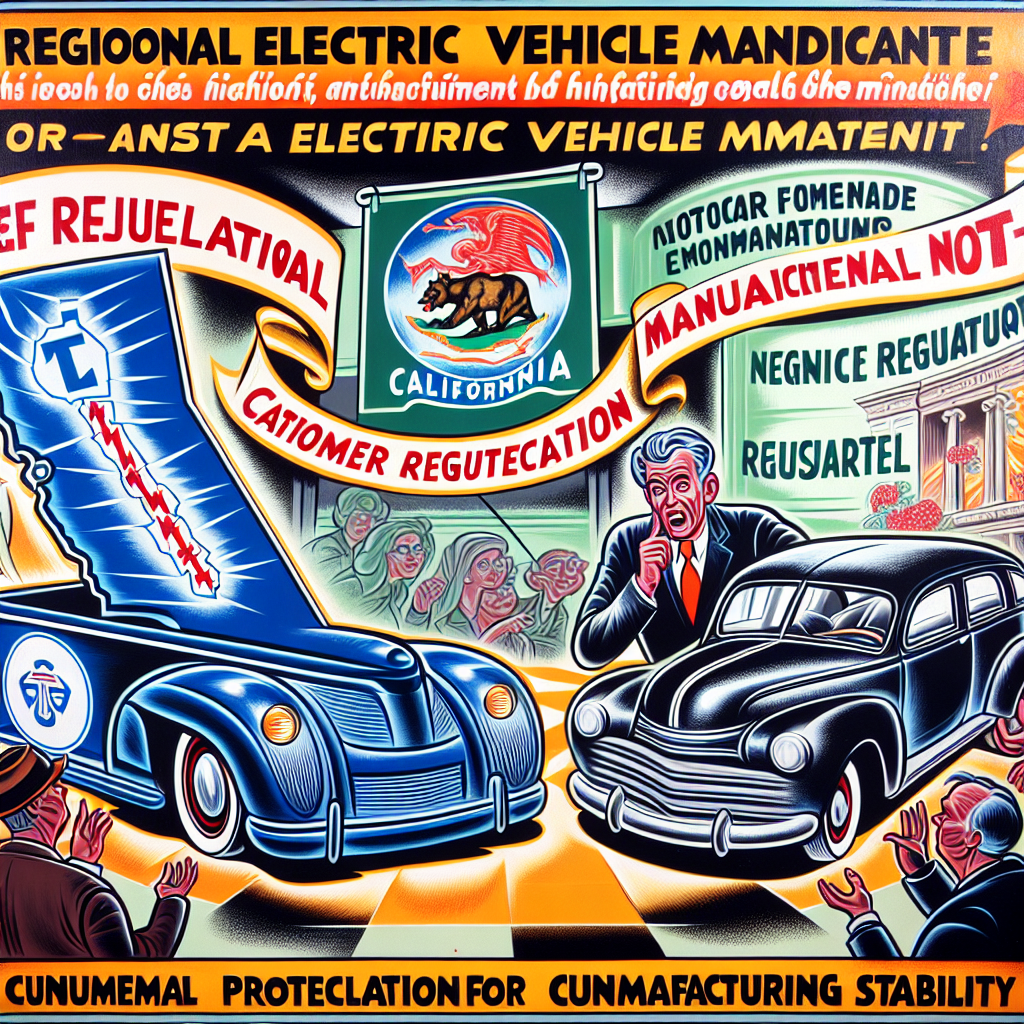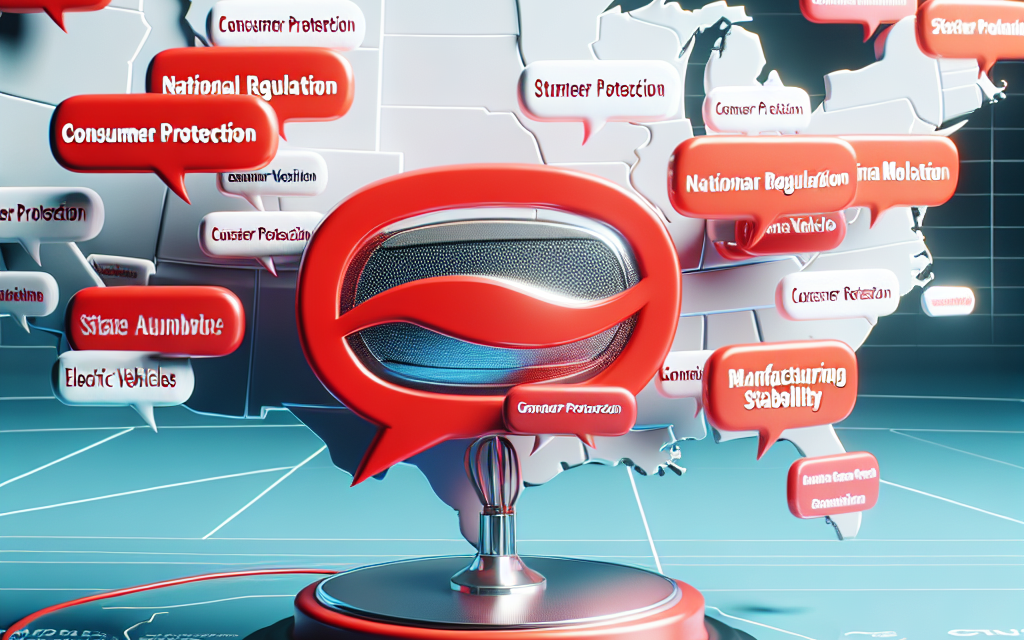“Toyota Challenges California’s EV Mandate: Advocating for Unified National Standards to Safeguard Consumers and Stabilize Manufacturing.”
Introduction
Toyota has recently voiced its concerns over California’s stringent electric vehicle (EV) mandate, advocating instead for a unified national regulation to ensure consumer protection and manufacturing stability. The automaker argues that California’s aggressive push for EV adoption could lead to market fragmentation and increased costs for consumers, as manufacturers struggle to meet varying state requirements. By calling for a cohesive national policy, Toyota emphasizes the need for a balanced approach that supports innovation and environmental goals while safeguarding economic interests and providing consistent standards across the automotive industry.
Toyota’s Stance on California’s EV Mandate: A Call for National Regulation
Toyota has recently voiced its concerns over California’s ambitious electric vehicle (EV) mandate, which aims to phase out the sale of new gasoline-powered cars by 2035. The automaker argues that such state-specific regulations could lead to a fragmented market, creating challenges for both consumers and manufacturers. Instead, Toyota advocates for a unified national regulation that would ensure consumer protection and manufacturing stability across the United States. This stance highlights the complexities and potential pitfalls of state-led initiatives in the rapidly evolving automotive industry.
California’s mandate is part of a broader effort to combat climate change and reduce greenhouse gas emissions. While the state’s intentions are commendable, Toyota believes that a patchwork of regulations across different states could lead to confusion and inefficiencies. For instance, consumers might face limited vehicle choices and higher costs if automakers are forced to comply with varying standards. Moreover, manufacturers could encounter increased production expenses and logistical challenges as they attempt to tailor their offerings to meet diverse state requirements. These factors could ultimately hinder the widespread adoption of EVs, which is contrary to the overarching goal of reducing emissions.
In advocating for national regulation, Toyota emphasizes the importance of a cohesive strategy that aligns with the interests of all stakeholders. A unified approach would provide a clear and consistent framework for automakers, enabling them to streamline production processes and reduce costs. This, in turn, could lead to more affordable EV options for consumers, thereby accelerating the transition to cleaner transportation. Furthermore, national regulation could facilitate the development of a robust charging infrastructure, which is crucial for supporting the growing number of EVs on the road.
Toyota’s call for national regulation also underscores the need for consumer protection in the evolving automotive landscape. As the industry shifts towards electrification, it is essential to ensure that consumers have access to reliable and safe vehicles. A standardized regulatory framework could help establish uniform safety and performance standards, thereby enhancing consumer confidence in EVs. Additionally, national regulation could address potential issues related to battery disposal and recycling, which are critical for minimizing the environmental impact of EVs.
While Toyota’s position may appear to be at odds with California’s progressive environmental policies, it is important to recognize the broader implications of state-specific mandates. The automaker’s concerns are rooted in the desire to create a sustainable and equitable transition to electric mobility. By advocating for national regulation, Toyota is not opposing the shift towards EVs but rather seeking to ensure that it is implemented in a manner that benefits all parties involved.
In conclusion, Toyota’s criticism of California’s EV mandate highlights the challenges associated with state-led initiatives in the automotive industry. The company’s call for national regulation reflects a commitment to consumer protection and manufacturing stability, which are essential for the successful adoption of electric vehicles. As the United States continues to navigate the transition to cleaner transportation, it is crucial to consider the potential benefits of a unified regulatory approach. By fostering collaboration and consistency, national regulation could pave the way for a more sustainable and efficient automotive future.
Consumer Protection Concerns in the Wake of California’s EV Policies
In recent years, California has positioned itself at the forefront of environmental policy, particularly with its ambitious mandates for electric vehicles (EVs). The state has set aggressive targets to phase out gasoline-powered cars, aiming for a future where zero-emission vehicles dominate the roads. However, this bold move has not been without its critics. Among the most vocal is Toyota, a global automotive leader, which has raised significant concerns about the implications of California’s EV mandate on consumer protection and manufacturing stability.
Toyota’s critique centers on the potential for California’s policies to create a fragmented regulatory landscape across the United States. The company argues that a patchwork of state-specific regulations could lead to confusion among consumers and manufacturers alike. For consumers, the lack of a unified national standard may result in limited vehicle choices and inconsistent pricing, as automakers struggle to comply with varying state requirements. This could ultimately undermine consumer confidence and hinder the widespread adoption of EVs, which is counterproductive to the overarching goal of reducing carbon emissions.
Moreover, Toyota emphasizes the importance of a balanced approach that considers the diverse needs and circumstances of consumers across different regions. While California’s climate and infrastructure may support a rapid transition to EVs, other states may face significant challenges, such as inadequate charging infrastructure or different economic conditions. A national regulation, Toyota suggests, would provide a more equitable framework that accommodates these regional differences, ensuring that all consumers have access to affordable and practical vehicle options.
In addition to consumer protection concerns, Toyota highlights the potential impact of California’s EV mandate on manufacturing stability. The automotive industry is a complex ecosystem that relies on a global supply chain and significant investment in research and development. Sudden shifts in regulatory requirements can disrupt this ecosystem, leading to increased costs and production delays. Toyota warns that without a coordinated national strategy, manufacturers may struggle to achieve economies of scale, which are crucial for reducing the cost of EVs and making them accessible to a broader audience.
Furthermore, Toyota argues that a national regulation would provide the industry with the clarity and predictability needed to make long-term investments in EV technology. This would not only benefit manufacturers but also foster innovation and competition, ultimately driving down prices and improving the quality of EVs available to consumers. By establishing a consistent regulatory framework, the federal government could facilitate a smoother transition to a sustainable transportation future, while also safeguarding the interests of consumers and manufacturers.
In conclusion, while California’s EV mandate represents a significant step towards addressing climate change, Toyota’s critique underscores the need for a more coordinated approach. By advocating for national regulation, Toyota seeks to ensure that consumer protection and manufacturing stability are not compromised in the pursuit of environmental goals. A unified strategy would provide the necessary support for both consumers and the automotive industry, paving the way for a successful transition to a cleaner, more sustainable future. As the debate continues, it is crucial for policymakers to consider the broader implications of state-specific mandates and work towards a solution that balances environmental objectives with economic and consumer interests.
Manufacturing Stability: Why Toyota Advocates for Uniform EV Regulations
Toyota has recently voiced its concerns over California’s ambitious electric vehicle (EV) mandate, advocating instead for a unified national regulation. The automaker argues that a consistent regulatory framework across the United States would better serve both consumers and manufacturers, ensuring stability and fairness in the rapidly evolving automotive industry. As California pushes forward with its stringent EV requirements, Toyota warns that such state-specific mandates could lead to a fragmented market, complicating compliance for manufacturers and potentially disadvantaging consumers.
The crux of Toyota’s argument lies in the potential for disparate state regulations to create a patchwork of standards that manufacturers must navigate. This scenario could lead to increased production costs, as automakers would need to tailor vehicles to meet varying state requirements. Such a fragmented approach could hinder the industry’s ability to achieve economies of scale, ultimately driving up prices for consumers. By advocating for a national standard, Toyota envisions a more streamlined manufacturing process that would facilitate cost-effective production and ensure that consumers across the country have equal access to affordable EV options.
Moreover, Toyota emphasizes the importance of consumer protection in the transition to electric vehicles. A national regulation would provide a consistent framework for safety and performance standards, ensuring that all EVs on the market meet the same rigorous criteria. This uniformity would not only protect consumers but also foster trust in the burgeoning EV market, encouraging wider adoption of electric vehicles. In contrast, varying state mandates could lead to confusion and uncertainty among consumers, potentially slowing the transition to cleaner transportation options.
In addition to consumer protection, Toyota highlights the need for manufacturing stability as a key reason for advocating national regulation. The automotive industry is a cornerstone of the American economy, providing millions of jobs and contributing significantly to GDP. A stable regulatory environment is crucial for manufacturers to plan long-term investments in technology and infrastructure. By establishing a consistent national standard, the government could provide the predictability that automakers need to innovate and invest confidently in the future of electric mobility.
Furthermore, Toyota’s call for national regulation aligns with broader environmental goals. A unified approach would enable the U.S. to set ambitious yet achievable targets for reducing greenhouse gas emissions from the transportation sector. By coordinating efforts at the national level, the government could implement comprehensive policies that support the development of necessary infrastructure, such as charging stations, and incentivize research and development in battery technology. This holistic approach would not only accelerate the transition to electric vehicles but also ensure that the environmental benefits are realized across the entire country.
In conclusion, Toyota’s criticism of California’s EV mandate underscores the need for a cohesive national strategy to guide the transition to electric vehicles. By advocating for uniform regulations, Toyota seeks to protect consumers, ensure manufacturing stability, and support the broader environmental objectives of reducing emissions. As the automotive industry stands on the brink of a transformative shift, a consistent regulatory framework will be essential in fostering innovation, maintaining economic stability, and ensuring that the benefits of electric mobility are accessible to all Americans.
The Impact of State-Specific EV Mandates on the Automotive Industry

In recent years, the automotive industry has witnessed a significant shift towards electric vehicles (EVs), driven by growing environmental concerns and technological advancements. However, the transition has not been without its challenges, particularly in the realm of regulatory frameworks. A notable development in this context is California’s ambitious mandate to phase out gasoline-powered vehicles, aiming for all new cars sold in the state to be zero-emission by 2035. While this initiative underscores California’s commitment to combating climate change, it has also sparked a debate within the industry, with Toyota emerging as a vocal critic. The company argues that state-specific mandates, such as California’s, could lead to a fragmented regulatory landscape, ultimately complicating the manufacturing process and potentially disadvantaging consumers.
Toyota’s criticism is rooted in the belief that a patchwork of state regulations could disrupt the automotive supply chain. When each state enacts its own set of rules regarding vehicle emissions and sales, manufacturers are faced with the daunting task of tailoring their production processes to meet diverse requirements. This not only increases operational complexity but also drives up costs, which may be passed on to consumers. Consequently, Toyota advocates for a unified national regulation that would provide a consistent framework for the industry, ensuring both consumer protection and manufacturing stability.
Moreover, Toyota emphasizes that a national approach would facilitate a more equitable transition to electric vehicles across the United States. While California’s mandate is a step towards reducing carbon emissions, it may inadvertently create disparities between states. Regions with less stringent regulations might lag in EV adoption, leading to an uneven distribution of environmental benefits. A nationwide policy could help bridge this gap, promoting uniform progress and ensuring that all states contribute to the reduction of greenhouse gas emissions.
In addition to addressing regulatory fragmentation, Toyota’s call for national regulation highlights the importance of consumer protection. The company argues that a standardized approach would provide consumers with clearer information and more consistent options when purchasing vehicles. This is particularly crucial as the market for electric vehicles continues to evolve, with new models and technologies emerging at a rapid pace. A cohesive regulatory framework would help consumers make informed decisions, fostering confidence in the transition to electric mobility.
Furthermore, Toyota’s stance underscores the need for collaboration between automakers, policymakers, and other stakeholders in shaping the future of transportation. By working together to establish a national standard, these entities can ensure that the shift to electric vehicles is both efficient and sustainable. This collaborative effort would not only benefit the environment but also support the automotive industry’s long-term growth and innovation.
In conclusion, while California’s EV mandate represents a significant step towards a greener future, it also raises important questions about the impact of state-specific regulations on the automotive industry. Toyota’s criticism highlights the potential challenges of a fragmented regulatory landscape and underscores the need for a unified national approach. By advocating for consistent regulations, Toyota aims to protect consumers, streamline manufacturing processes, and promote equitable progress in the transition to electric vehicles. As the industry continues to evolve, it is crucial for stakeholders to work together in developing policies that balance environmental goals with economic and consumer interests.
National vs. State Regulations: Toyota’s Perspective on EV Policies
Toyota has recently voiced its concerns over California’s ambitious electric vehicle (EV) mandate, advocating instead for a unified national regulation that would ensure consumer protection and manufacturing stability. This stance highlights the ongoing debate between state-specific policies and the need for a cohesive national framework in the rapidly evolving automotive industry. As California continues to push forward with its stringent environmental goals, Toyota argues that a patchwork of state regulations could lead to inconsistencies that may ultimately hinder the broader adoption of electric vehicles across the United States.
California’s mandate, which aims to phase out the sale of new gasoline-powered vehicles by 2035, is part of the state’s aggressive strategy to combat climate change and reduce greenhouse gas emissions. While this initiative has been praised by environmental advocates, it has also raised concerns among automakers about the feasibility of meeting such targets without a standardized national policy. Toyota, a global leader in automotive manufacturing, contends that a national regulation would provide a more stable and predictable environment for both manufacturers and consumers.
One of Toyota’s primary arguments is that a national regulation would help protect consumers by ensuring that EV infrastructure and technology are developed uniformly across the country. This would prevent potential disparities in charging infrastructure and vehicle availability that could arise from state-specific mandates. For instance, consumers in states with less stringent regulations might face challenges in accessing the same level of EV support and infrastructure as those in states like California. A national approach would help mitigate these issues by promoting a consistent rollout of EV technology and infrastructure nationwide.
Moreover, Toyota emphasizes that a unified national policy would contribute to manufacturing stability by providing clear guidelines and expectations for automakers. This would enable manufacturers to streamline their production processes and invest in the necessary technology and infrastructure with greater confidence. In contrast, a fragmented regulatory landscape could lead to increased costs and complexity for automakers, as they would need to navigate varying state requirements and potentially produce different vehicle models to comply with each state’s regulations.
In addition to these practical considerations, Toyota also highlights the potential economic benefits of a national regulation. By fostering a more predictable and stable market environment, a unified policy could encourage greater investment in EV technology and infrastructure, ultimately driving innovation and job creation within the industry. This would not only benefit automakers but also contribute to the broader economic growth and competitiveness of the United States in the global automotive market.
While Toyota’s call for national regulation has sparked debate, it underscores the importance of balancing environmental goals with practical considerations for consumers and manufacturers. As the automotive industry continues to transition towards electrification, finding a middle ground between state-specific mandates and a cohesive national policy will be crucial in ensuring a smooth and successful shift to electric vehicles.
In conclusion, Toyota’s criticism of California’s EV mandate and its advocacy for national regulation reflect the complexities of navigating the transition to a more sustainable automotive future. By promoting a unified approach, Toyota aims to protect consumers, stabilize manufacturing processes, and drive economic growth, ultimately contributing to the broader adoption of electric vehicles across the United States. As policymakers and industry leaders continue to grapple with these challenges, the need for collaboration and compromise will be essential in shaping the future of transportation.
Balancing Innovation and Consumer Needs: Toyota’s Critique of California’s EV Mandate
Toyota has recently voiced its concerns regarding California’s ambitious electric vehicle (EV) mandate, which aims to phase out the sale of new gasoline-powered cars by 2035. The automaker argues that while the initiative is well-intentioned, it may inadvertently create challenges for both consumers and manufacturers. Toyota’s critique centers on the need for a more balanced approach that considers consumer protection and manufacturing stability, advocating instead for a unified national regulation that could provide a more consistent framework for the automotive industry.
To begin with, Toyota acknowledges the importance of transitioning to cleaner energy sources and reducing carbon emissions. The company has been a pioneer in hybrid technology and is actively investing in the development of EVs and hydrogen fuel cell vehicles. However, Toyota contends that California’s mandate, by focusing solely on electric vehicles, may overlook the diverse needs of consumers across different regions. For instance, the infrastructure required to support a full transition to EVs, such as charging stations, is not uniformly available across the United States. This disparity could lead to significant inconveniences for consumers, particularly in rural areas where charging infrastructure is sparse.
Moreover, Toyota raises concerns about the potential economic impact on the automotive industry. The mandate could disrupt existing manufacturing processes and supply chains, leading to increased costs that may ultimately be passed on to consumers. By advocating for a national regulation, Toyota suggests that a more gradual and flexible approach could allow manufacturers to adapt more effectively, ensuring that the transition to cleaner vehicles does not come at the expense of economic stability. A national framework could also facilitate the development of a more comprehensive infrastructure plan, addressing regional disparities and ensuring that all consumers have access to the necessary resources to support EV adoption.
In addition to these logistical and economic considerations, Toyota emphasizes the importance of consumer choice. The company argues that a singular focus on electric vehicles may limit the options available to consumers, who may have varying preferences and needs. For example, hybrid vehicles, which combine gasoline engines with electric motors, offer a practical alternative for those who are not yet ready to fully commit to an electric vehicle. By promoting a diverse range of technologies, a national regulation could encourage innovation and competition within the industry, ultimately benefiting consumers by providing them with a wider array of choices.
Furthermore, Toyota highlights the potential environmental benefits of a more inclusive approach. While electric vehicles are a crucial component of reducing emissions, other technologies, such as hydrogen fuel cells, also offer significant potential for environmental impact. By supporting a variety of clean energy solutions, a national regulation could accelerate the overall reduction of carbon emissions, contributing to a more sustainable future.
In conclusion, while Toyota supports the transition to cleaner vehicles, it urges policymakers to consider a more balanced approach that takes into account the diverse needs of consumers and the economic realities of the automotive industry. By advocating for a national regulation, Toyota envisions a framework that promotes innovation, ensures consumer protection, and maintains manufacturing stability. As the conversation around clean energy and transportation continues to evolve, it is crucial to strike a balance between ambitious environmental goals and the practical considerations that will ultimately determine their success.
The Future of EV Manufacturing: Lessons from Toyota’s Criticism of California’s Approach
Toyota’s recent criticism of California’s electric vehicle (EV) mandate has sparked a significant debate about the future of EV manufacturing in the United States. The automaker argues that California’s aggressive push for electric vehicles, while well-intentioned, may inadvertently lead to unintended consequences for both consumers and manufacturers. By urging for a national regulation, Toyota highlights the need for a more balanced approach that considers the diverse needs of the American market and the stability of the automotive industry.
California’s mandate, which aims to phase out the sale of new gasoline-powered vehicles by 2035, is one of the most ambitious in the world. It reflects the state’s commitment to reducing greenhouse gas emissions and combating climate change. However, Toyota contends that such a unilateral approach could create disparities across the nation. The company suggests that a patchwork of state regulations could lead to confusion among consumers and inefficiencies in manufacturing processes. This is particularly concerning for automakers that operate on a national and global scale, as they must navigate varying standards and requirements.
Moreover, Toyota emphasizes the importance of consumer protection in the transition to electric vehicles. The company argues that a national regulation would ensure that all consumers, regardless of their state of residence, have access to affordable and reliable EV options. This is crucial, as the cost of electric vehicles remains a significant barrier for many potential buyers. By establishing a consistent regulatory framework, the federal government could facilitate economies of scale, driving down costs and making EVs more accessible to a broader audience.
In addition to consumer protection, Toyota raises concerns about the stability of the manufacturing sector. The company warns that California’s mandate could disrupt existing supply chains and lead to job losses in regions heavily reliant on traditional automotive manufacturing. A national regulation, on the other hand, could provide a more gradual transition, allowing manufacturers to adapt and invest in new technologies without jeopardizing their workforce. This approach would also encourage innovation, as automakers would have the flexibility to explore a range of solutions, from hybrid vehicles to hydrogen fuel cells, in addition to battery-electric models.
Furthermore, Toyota’s call for national regulation underscores the need for collaboration between government and industry. By working together, policymakers and automakers can develop a comprehensive strategy that addresses environmental goals while also considering economic and social impacts. This partnership could lead to the creation of incentives for research and development, infrastructure investment, and workforce training, all of which are essential for a successful transition to a sustainable transportation future.
In conclusion, Toyota’s criticism of California’s EV mandate serves as a reminder of the complexities involved in transforming the automotive industry. While the state’s efforts to combat climate change are commendable, a more coordinated national approach could offer a balanced solution that protects consumers, supports manufacturing stability, and fosters innovation. As the United States moves towards a greener future, it is imperative that all stakeholders work together to ensure that the transition to electric vehicles is both equitable and sustainable.
Q&A
1. **What is Toyota’s main criticism of California’s EV mandate?**
Toyota criticizes California’s EV mandate for being too aggressive and potentially disruptive to both consumers and the automotive industry.
2. **Why does Toyota believe a national regulation is necessary?**
Toyota argues that a national regulation would provide a consistent framework across all states, ensuring consumer protection and manufacturing stability.
3. **How does Toyota view the impact of California’s mandate on consumers?**
Toyota believes that the mandate could limit consumer choice and increase vehicle costs, potentially making electric vehicles less accessible to the average consumer.
4. **What concerns does Toyota have regarding manufacturing stability?**
Toyota is concerned that the mandate could lead to supply chain disruptions and increased production costs, affecting the stability of automotive manufacturing.
5. **How might a national regulation benefit the automotive industry, according to Toyota?**
A national regulation could create a unified market, reducing complexity and costs associated with meeting different state requirements, and fostering innovation and investment in EV technology.
6. **What is Toyota’s stance on electric vehicles in general?**
Toyota supports the transition to electric vehicles but advocates for a more gradual and flexible approach that considers various consumer needs and technological advancements.
7. **How does Toyota propose balancing environmental goals with consumer and industry needs?**
Toyota suggests implementing a balanced approach that includes incentives for EV adoption, investment in infrastructure, and support for hybrid and alternative fuel technologies alongside pure electric vehicles.
Conclusion
Toyota’s criticism of California’s EV mandate highlights concerns about the potential economic and logistical challenges posed by state-specific regulations. The company argues that a unified national regulation would better protect consumers and ensure manufacturing stability by providing consistent standards across the country. This approach could facilitate a smoother transition to electric vehicles, reduce costs, and enhance the competitiveness of the automotive industry. By advocating for national regulation, Toyota emphasizes the need for a balanced strategy that considers both environmental goals and the practical implications for consumers and manufacturers.





